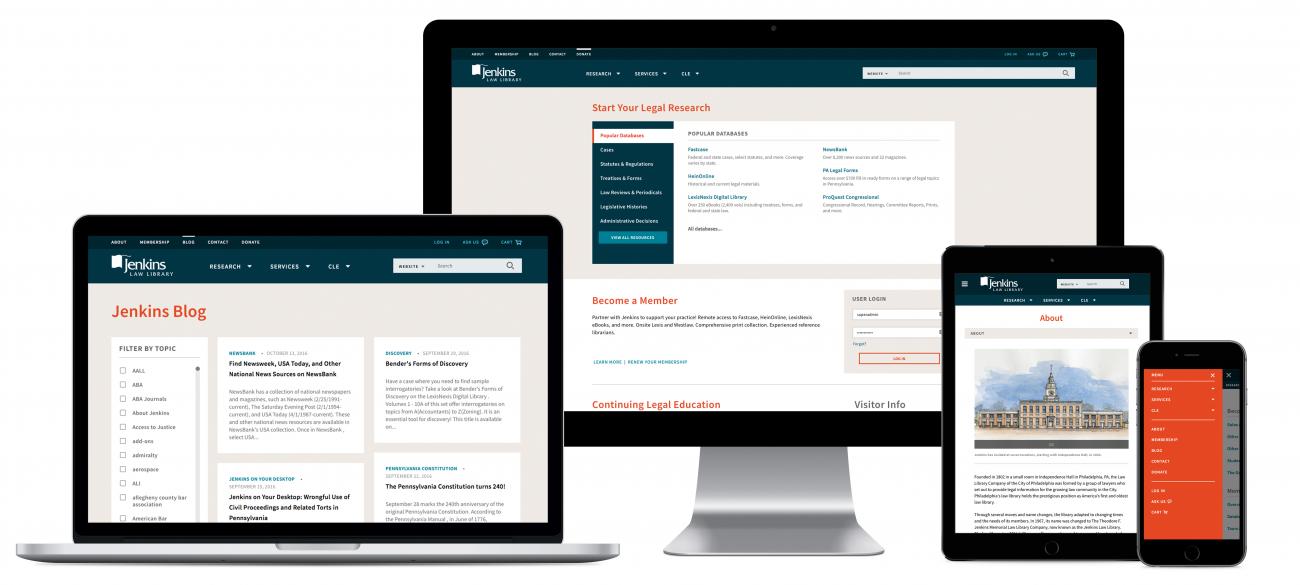Jenkins Law Library
Jenkins Law Library—founded in 1802 in Independence Hall—holds the distinction of being the first and oldest law library in the United States of America. At the time of its founding, the Library was created to provide legal information to Philadelphia's growing legal community. A 501 (c) (3) with 12 librarians and 14 support staff, the Library continues to provide legal and law-related information, databases, research services, and continuing legal education (CLE) classes to its more than 7,000-member base. Jenkins Law Library came to Message Agency to the improve accessibility and quality of the Library's resources and better communicate its value to the legal community.

The Challenge
Jenkins Law Library possesses significant legal resources but it struggled to take full advantage of its strengths. An aging site—coupled with increased competition from peer libraries and third-party subscription services—posed an issue for its administration and users. The site's navigation schema grouped content under major sections that obscured important features and resources, making it difficult to organically browse. Furthermore, the lack of cohesion in user interfaces across the Library's catalog and databases resulted in inconsistent user experience and brand identity.

The Strategy
The Library's audience consists of current and prospective members, CLE participants, and the general public. Its primary audience—current and prospective members—was further segmented according to three attributes: physical proximity to the library, profession within the legal community, and the size of their firm.
These audience definitions were used in tandem with the following goals to define the design and development of the new site:
- Establish a clear and effective messaging strategy that articulates the Library’s value and better promotes its services
- Increase the findability and accessibility of relevant legal content and resources
- Streamline Library members' abilities to authenticate online and manage their memberships
- Reduce staff time and effort required for site administration and systems maintenance
- Improve marketing, registration, and administration of membership packages for CLE course offerings and credits
- Develop and curate legal content for advocates and citizens seeking support for self-representation
- In terms of visual design, we were challenged with a lack of photographs and other imagery to express the Library's brand. Our solution was to create visual interest through a design system that uses a clear type hierarchy and a color palette that nods to the library's status as an early U.S. institution.

Accessing Library Resources
We built an e-commerce platform in Drupal that allows users to donate to the Library, purchase or renew memberships, and register for CLE courses. The platform is supported by a bi-directional Salesforce integration and a database authentication that allows single sign-on to Jenkins' library resources. These features improve the library's ability to manage access to third-party databases and administer member benefits and discounts.
The integration and authentication features also connect the website to revenue-generating services and enable the library to capture user data that is critical to its membership model. In particular, the site now allows solo members to purchase and manage their memberships; this represents both a huge potential revenue source and a way to modernize the library's business model.
Another key component was the transformation of a hard-coded and authentication scheme for accessing third-party databases into a flexible solution driven by data points in Salesforce. Jenkins staff can now add new databases and permissions in Salesforce as needed, without the intervention of a developer.

Navigating the Collection
The site places an emphasis on organization and navigation, embracing the inherent role of libraries in advancing the visibility and findability of resources and information. In the previous iteration of the website the main navigation was structured to mirror the internal organization of the library. We reworked the navigation to map onto the mental models of the library's audience, structuring the menus to surface options and align to the core tasks that users needed to complete. The "start your legal research" widget serves as the centerpiece of the homepage and helps to further position the most popular library resources front and center to the user's experience. In line with the emphasis on navigability and findability, the CLE portal was revamped to better display available courses as well as information related to previously completed courses.

Finding the Right Information
Research Guides are tools produced by library staff that highlight information available in the library's collection that relate to a specific topic. Research Guides range from topics including divorce and custody to securities law and restatement of trusts. We helped the library to redesign their resource guides to better serve as more exhaustive, intuitive guides for users directing their own legal research or pursuing personal legal issues.
